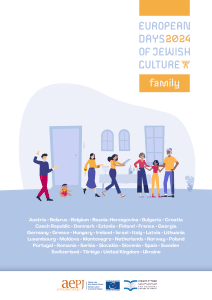Information for coordinators
and participating institutions
European Days of Jewish Culture 2024: Family
Dear EDJC Coordinator,
We are pleased to inform you about the central theme of the next edition of the European Days of Jewish Culture 2024 festival, which will be:
Family
Read on to find important dates, processes and resources for organising an EDJC 2024 activity. More information will be added to this page soon. For any questions or information please do not hesitate to contact us at edjc@jewisheritage.org.

This project has been extensively reinforced by the collaboration with the National Library of Israel, which has acted as a means to develop all kinds of exhibition and educational materials, which have given an important added value to the festival while facilitating its celebration throughout the continent.

EDJC Kick-off:
September 1st, 2024
Events and activities from September to November 2024

Organising an EDJC 2024 activity
1. Register to the Organisers & Coordinators newsletter
To keep up to date with organisational news from the EDJC please register through the following form if you haven’t already done so:
2. Download the text about Family
Download the inspirational text to start exploring Memory and thinking about your activities for the EDJC.
3. Watch the EDJC Organisers & Coordinators Meeting recording
On the 7th of March, 2024, we celebrated the annual gathering that brings together stakeholders from across Europe. If you did not have the opportunity to attend, you can watch the recordings of the main sessions at this link.
4. Watch the Inspiring EDJC Session
Watch the recording of an online event featuring Luca Baraldi, an expert in cross-cultural analysis and strategic intelligence, in which he explores the connection between last year’s theme, Memory, and this year’s focus, Family.
5. Download the editable Poster
As every year, we propose a design that you can translate and adapt to your needs and that helps to create a homogeneous festival and facilitate communication between organisers and participants. In addition, this year we have incorporated an option to edit the poster through the Canva platform.
6. Download the NLI exhibition
Download the editable files to translate, adapt and print the exhibition prepared by the National Library of Israel.
7. Submit your activities
Please fill in the following form to submit your event to the EDJC website. If you want to submit several events, you can re-fill the form as many times as you need. A moderator will review the content and shortly it will be uploaded to the website.
⚠ If you are coordinating more than 15 activities, you can upload them in bulk via a CSV file. Contact us at edjc@jewisheritage.org to use this procedure.
8. Submit your report & feedback
Thank you for organising one or more activities of the European Days of Jewish Culture 2024! Please fill in this form to have your activities highlighted in the EDJC 2024 report.
The European Days of Jewish Culture 2024: Family
Exploring Family as a central theme for the EDJC 2024
“Family” in European Jewish culture is a theme with a range of dimensions and depth. It encompasses the enduring influence of tradition, from biblical narratives of patriarchs and matriarchs to the timeless commandment to “Honour thy father and mother.” These traditions continue to shape contemporary family life and family, roles and models, connecting the past to the present.
In today’s world, Jewish families face the delicate balance of preserving heritage while adapting to the demands of modern life, the challenging issues of diverse family structures like interfaith marriages, LGBTIQA+ and family dynamics. Moreover, the evolving role of women within Jewish families, transitioning from traditional to more inclusive positions, adds a fascinating dimension to the discussion.
Beyond blood relations, the concept of a “chosen family” and close-knit communities as extended families are vital aspects of European Jewish culture. This dimension also provides an opportunity to reflect on historical events that have profoundly shaped the understanding of family within European Jewish communities, such as the Holocaust and the Jewish diaspora.
Europe’s tapestry of Jewish communities, each with its unique traditions and customs, further enriches our exploration of family. The diversity in family rituals and values serves as a testament to the richness of Jewish culture in the region. Understanding generational shifts in how family is perceived and how cultural values are transmitted is essential. How do younger generations interpret and carry forward the traditions of their ancestors while adapting to the contemporary world, how our oldest family members are supported and are part of an educational path for their grandchildren who take on the heritage of the Jewish experience, complex, challenging and fascinating, but often marked by a dramatic recent history.
Looking ahead, we contemplate how the concept of family may evolve within the European Jewish context, addressing emerging dynamics and challenges to ensure the continued strength and relevance of Jewish family life in Europe. This multifaceted theme offers a comprehensive perspective on the significance of “Family” in European Jewish culture, bridging the traditions of the past with the dynamism of the present and future.
